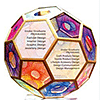BVA Syllabus and Subjects

BVA syllabus is curated for four years with eight semesters each. The Bachelor of Visual Arts syllabus deals with the knowledge of designing and artworks to meet the needs of businesses and other organizations. The courses under curriculum are designed in a way that students should meet all aspects of visual arts and give several achievements to this country. In the BVA course, students study subjects such as Illustration, Animation, Sculpture, and Architecture.
Semester Wise BVA Syllabus
The BVA syllabus includes an introduction to all forms of visual arts, specialization course subjects, and subjects to gain some practical knowledge on it. The BVA course syllabus covers different subjects in a detailed manner, during the period of 4 years. Listed below is the semester wise syllabus for the BVA course:
|
Semester I |
Semester II |
|
Drawing from Nature/Object |
Drawing from Human Fig./Antic. |
|
Print – Making |
3D Design |
|
Fundamentals of Arts with 2-d Design Theory/Practical |
Fundamentals of Arts with 2D Design (Advance) Theory/Practical |
|
Indian Culture and Arts (Prehistoric to 7th Century) |
Indian Culture and Arts (9th Century to 13th Century) |
|
C.C. English. |
C.C. English |
|
Regional Language: C.C. Marathi /Hindi |
Regional Language: C.C. Marathi / Hindi |
|
Semester III |
Semester IV |
|
Still Life (Rendering) |
Still Life (Painting) |
|
Head Study (Rendering) |
Head Study (Painting) |
|
Print-Making II |
Pictorial Composition |
|
Indian Culture and Arts (14th Century to 18th Century) |
Indian Culture and Arts (19th Century to Contemporary) |
|
Fundamentals of Computer |
History of Western Art ( Prehistoric to 8th Century) |
|
Semester V |
Semester VI |
|
Drawing from Life (Rendering Full figure on ½ imp. Paper) |
Painting from Life (full figure) |
|
Composition (Basic) |
Composition (Advance) |
|
Mural Design I |
Mural Design II |
|
Western Aesthetics |
Indian Aesthetics |
|
History of Western Art (09th Century to 13th Century) |
History of Western Art (14th Century to 18th Century) |
|
Computer (advance) |
C.C. English |
|
C.C English |
- |
|
Semester VII |
Semester VIII |
|
Portrait Painting |
Portrait (3/4 Size) |
|
Creative Painting Part I |
Creative Painting Part II |
|
Mural Design III |
Mural Design IV |
|
History of Western Art (14th Century to 18th Century) |
Dissertation |
|
- |
Viva |
BVA Subjects
The semester-wise BVA course subjects are designed to enhance the overall knowledge and give a deep understanding of the concepts to the students. The BVA syllabus includes both theoretical classroom-based teaching and practical lab sessions for a better understanding of advanced application-related topics. The curriculum consists of both core and elective subjects to make the four-year-long program more flexible. The Bachelor of Visual Arts subjects list is as follows:
- Fundamentals of computer
- Mural Design
- 3D Design
- Indian Aesthetics
BVA Course Structure
BVA course structure is designed to include both core and elective subjects. The BVA course consists of 4 years divided into eight semesters. In the primary year, college students are delivered to fundamental essential topics. While the successive year is for the students to choose the subjects they are to expertise. In addition, practical lab classes strengthen the knowledge of theoretical concepts.
Project submission during the final year is obligatory as in step with the curriculum. The course structure is as follows:
- VIII Semesters
- Core Subjects
- Elective Subjects
- Practical Workshops
- Project/ Thesis Submission
BVA Teaching Methodology and Techniques
The BVA course adopts various teaching methods. Teachers and professors are trained enough to give or provide knowledge in both traditional and practical manner. The elective papers are attributed to credits obtained by the students who are pursuing a BVA degree. The methodology and teaching strategies, in general, are listed below:
- Group Projects
- Traditional Classroom-Based Teaching
- Practical Lab Sessions
- Talks from guest speakers
- Seminars
- Semester Abroad Opportunities
BVA Projects
Projects for Bachelor of Visual Arts assist students in getting hands-on experience and training in industrial work. BVA Projects are to be completed by the end of the fourth semester. A few popular projects list in the field of visual arts are:
- Re-branding Royco Brand Of Food Seasoning
- Development Of Sculpture With Organic Forms: An Exploration With Calabash For The Exterior Space
- Air As A Medium Of Expression In Sculpture
- The Effects Of The Socratic Method On Students Art Performances In Secondary Schools In Kaduna- Nigeria
BVA Reference Books
BVA books are available both online and offline in many authors and publications. Reference books are meant for a better understanding of concepts and are also available online in pdf format. Some of the best reference books for BVA are:
|
Name of Book |
Author |
|
Complete Book of Drawing Technique |
Peter Stanyer |
|
Fun with the Pencil |
Loomis |
|
Dynamic Figure Drawing |
Burne Hogart |
|
Principles of Research Design in the Social Sciences (Social Research Today) |
Frank Bechhofer |
|
The Art of storyboard |
John Hart |
|
How to write for Animation |
Jeffrey Scott |
























